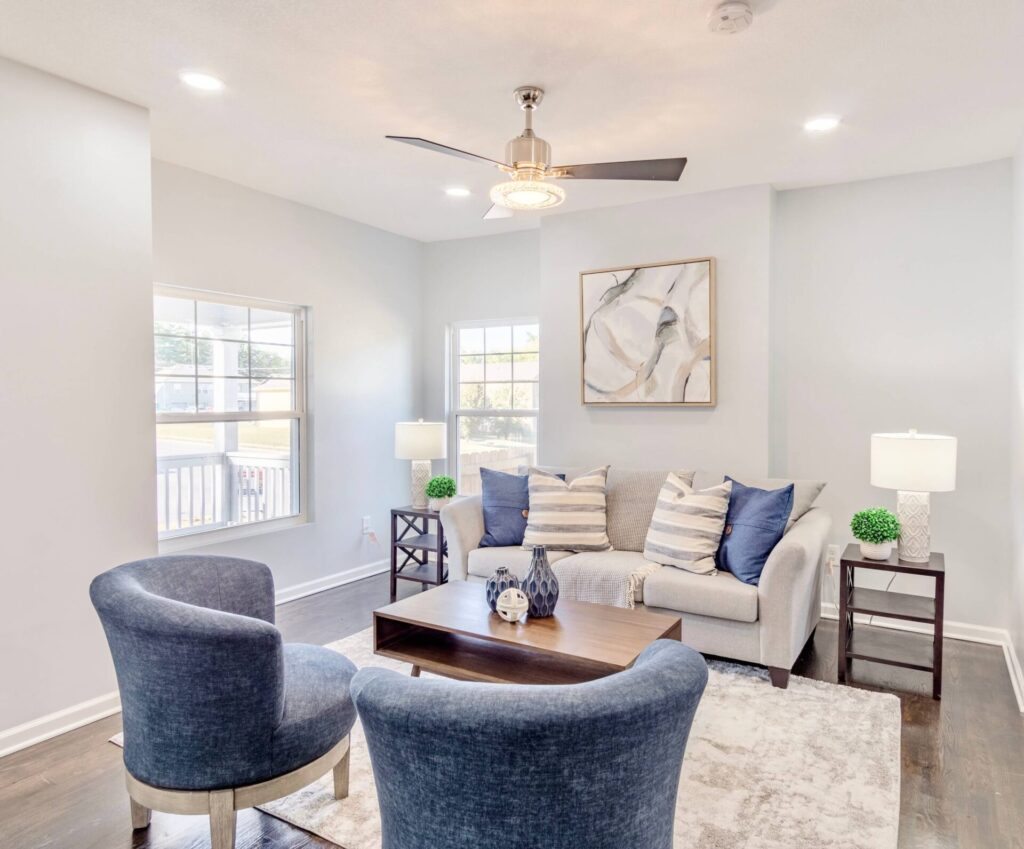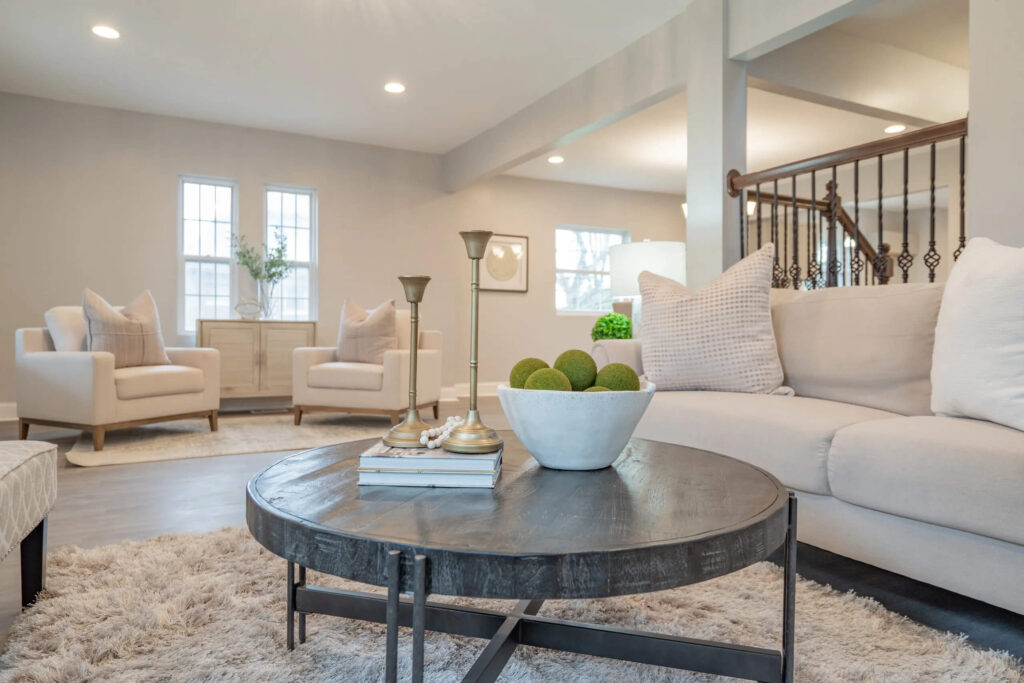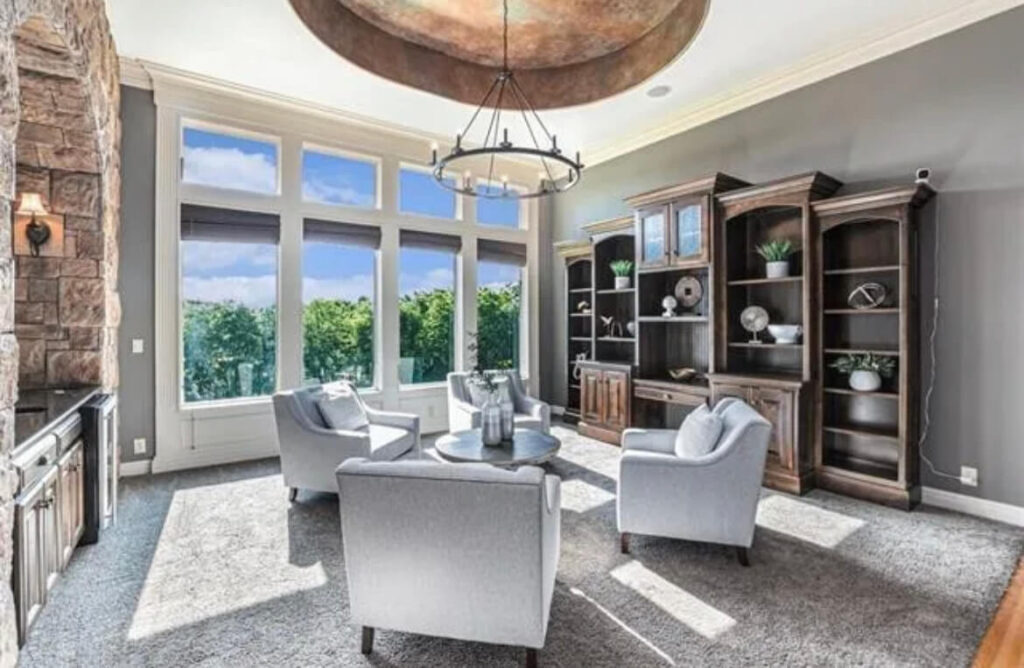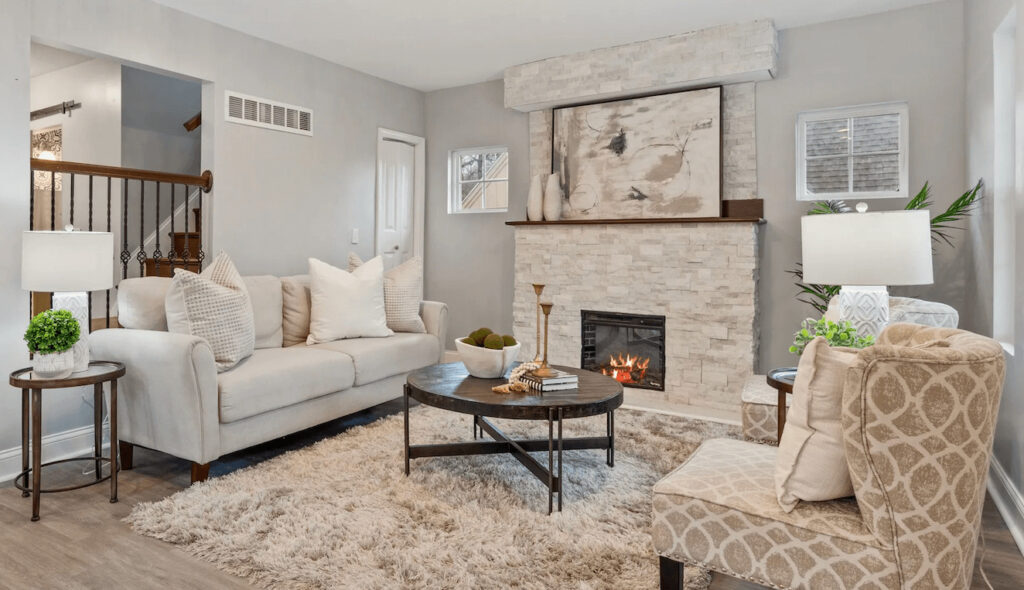This week we invite you to get to know RESA® Member and owner of Dreamy Home Designs, Staphanie Newsom. Dreamy Home Designs offers clients in the Kansas City metro and surrounding areas a variety of services; vacant and occupied home staging, new construction design and staging, and Airbnb styling and sourcing.
Staphanie credits her mom with sparking her love of interior design:
My love for interior design started early, thanks to my mom and how well she kept our home. As I got older, nothing made my heart happier than styling my own home. After watching many episodes of HGTV design shows, I decided to leverage my natural talent and leap into the business.
Staphanie took core home staging training from RESA® Accredited Education Provider, Staging Studio. She completed two Staging Design Professional™ Certifications, one at the Expert Level and at the Master Level.
These courses not only taught me the fundamentals of staging but also gave me the hands-on training I needed to start and grow my business. It was essential to me to have these principles and not just the design piece.
The Home Stager’s Perspective: A Conversation with Staphanie Newsom

ALL PHOTOS PROVIDED BY DREAMY HOME DESIGNS
Q: How does your commitment to RESA®, the exclusive nonprofit trade association for stagers, align with your professional goals and values? Share your perspective in detail.
Staphanie: My professional goals align with RESA®’s mission of advancing professionalism and excellence in real estate staging. It is our goal to hold an industry standard and provide maximum profit for our clients.
Q: What inspired the beginning of your staging journey? We’d love to hear the story behind your career’s inception in vivid detail.
Staphanie: My love for interior design started early, thanks to my mom and how well she kept our home. As I got older, nothing made my heart happier than styling my own home. After watching many episodes of HGTV design shows, I decided to leverage my natural talent and leap into the business. I got certified with Staging Studio, which has been extremely instrumental in the growth of my business. I took their expert-level course, as well as attended their master class. These courses not only taught me the fundamentals of staging but also gave me the hands-on training I needed to start and grow my business. It was essential to me to have these principles and not just the design piece.
Q: Take us back to your very first day on the job as a home stager. What were your feelings, expectations, and the most memorable moments from that day?
Staphanie: My very first staging was surreal. I couldn’t believe someone had actually hired me, that I’d never met or shown my work to. At the time I didn’t have a crew, so my family all pitched in to help me. It took a total of 4 hours to complete. I was shocked that I actually did it and was now an official stager.
Q: How has your perception of the staging industry evolved since you started?
Staphanie: Before becoming a stager, I never knew that people were doing this as their career. I thought it was just realtors, wives of builders, or friends of investors, that would stage just to help out. But oh was I wrong. As I dove more into it, I discovered an enormous community of stagers and endless possibilities.
Q: Would you share some insights into your creative process? Where do you typically find inspiration for your staging designs, and how do you translate that into your work?
Staphanie: I naturally had a talent for design. It’s like I could look at a room and in my head redesign it for its best use. However, I love HGTV and some amazing IG designers. But overall I trust my gut when staging. I envision the design and go from there.
Q: Prior to entering the staging industry, did you have a different career path or profession? If so, please share some details about it. How have the skills and experiences from your previous career uniquely equipped you for success in the world of staging?
Staphanie: I worked for a construction company as a Sr. Project Coordinator for 10 years. The company was amazing and taught me a lot of interpersonal skills that helped me move into my business. The company was big on self-development but also taught us the best ways to serve our clients. I’ve been able to take those tools and apply them to my business.

Q: Can you recall a particularly challenging staging project? What obstacles did you face, and how did you overcome them? What did you learn from that experience?
Staphanie: After staging for 3 years with all satisfying clients, I came across my first client who was not satisfied with my staging. We talked through their expectations and what I could actually provide for them. I made some necessary adjustments that made them happy. A few months later they reached back out to me for another staging.
Q: Staging often involves collaboration with real estate agents. Could you share some insights into how effective communication and partnership between stagers and agents can lead to successful property sales?
Staphanie: I’ve learned that real estate agents are typically always on the go and juggling multiple things at once. So being as thorough but brief as possible has always helped. Also, texting agents rather than calling gets me a faster response.
Q: Staging can transform a property, but it’s not just about aesthetics. How do you balance design principles with the practical aspects of making a home more marketable?
Staphanie: I try to always think of the triggered buyer when staging. While also enhancing some of the not-as-favorable parts of the home
Q: Could you share a memorable success story where your staging made a significant impact on a property’s sale price or time on the market? What were the key elements that contributed to that success?
Staphanie: When staging my first million-dollar home, we knew it would be important to clearly define each space. The home was over 6,000 sqft, and helping buyers see the layout was crucial. The property went under contract in 3 days and sold over the asking price.
Q: If you could stage a home for any celebrity, living or historical, who would it be, and what kind of design theme would you choose for their home?
Staphanie: It would be for Alicia Keys and her Marvel Razor house. I would design it in a modern way but with futuristic features.

Q: The staging industry often requires adaptability and flexibility. How do you stay current with market demands and changing client preferences? What strategies do you use to continuously improve your skills and stay competitive?
Staphanie: I continue learning and training with Staging Studio as well as with RESA®. There have been times when properties are taking a little bit longer to sell and we adjust our contract to meet the needs of our clients.
Q: Beyond aesthetics, what do you believe are the most important qualities or skills that a successful home stager should possess? How have these qualities shaped your own career?
Staphanie: Understanding the demographics of an area is very important. As well as being approachable and trustworthy.
Q: In the world of home staging, sometimes surprises happen. Could you share a funny or unexpected moment that occurred during one of your staging projects? How did you handle it?
Staphanie: One time the key the investor gave us wasn’t working, so they advised us to climb through the window to get into the house. Thankful for them I could fit through it and the staging continued as planned.
Q: Imagine you could time travel to any era in history to stage a home. Which time period would you choose, and what elements from that era would you incorporate into the design?
Staphanie: It would be the 1800s in the Regency era. I would incorporate the fine arts, sleek surfaces, and bold contours.

Q: If you could collaborate with any famous interior designer or decorator, living or deceased, on a staging project, who would it be and why? What do you think you could learn from them?
Staphanie: It would be Galey Alix. I love how creative she is and how she thinks outside the box. Sometimes as stagers, we can get caught up in the fundamentals of staging that we forget to tap into our creative side. With Galey, this wouldn’t happen.
Q: Home staging is a competitive field. What advice do you have for other staging professionals looking to stand out in the market and build a strong client base?
Staphanie: It took me some time to get here but I would say being my authentic self. I tapped into what made me fall in love with staging and leveraged that. You don’t have to be the next TikToker to stand out but you do need to just be you.
Q: Balancing creativity with the demands of running a business can be challenging. What tools or systems do you use to manage your staging projects efficiently and stay organized in your daily operations?
Staphanie: I haven’t quite mastered this yet but my plan is to invest in Stageforce to keep things organized. Right now it’s just me and my spreadsheets.
Q: What are some common misconceptions or objections you’ve encountered about home staging, and how do you educate potential clients or naysayers about the benefits it brings to the selling process?
Staphanie: A misconception I get is there is no need to stage during a seller’s market. I would advise that yes, a home will still sell unstaged but staging it will raise the perceived value thus possibly raising the potential profit of the home.
Q: Client testimonials and reviews can build trust with prospective clients. How do you encourage satisfied clients to share their positive experiences, and how has this influenced your ability to acquire new clients?
Staphanie: After each stage, I send each client a link to leave a Google review of our work. This has helped me tremendously with new clients and them wanting to see my credibility
Q: How can real estate agents better communicate the value of staging to their clients, and what role can they play in making the staging process smoother and more effective?
Staphanie: I believe all real estate agents should offer staging as part of their marketing plan to some degree. Real estate agents have an obligation to serve their clients to their fullest ability. Are they doing so if they don’t offer staging? Having a stager on hold to speak with clients during listing appointments would help them better understand the value.
You can find out more about Staphanie and Dreamy Home Designs at https://dreamyhomedesigns.com/
- Messy Branding, Messy Business: Key Takeaways from Laurie Graham’s Webinar - February 24, 2025
- Key Takeaways from Holly Gosa’s Exclusive RESA® Webinar - January 8, 2025
- Ultimate 2025 Success Plan for Stagers: Insights from Marianne Cherico - December 28, 2024


